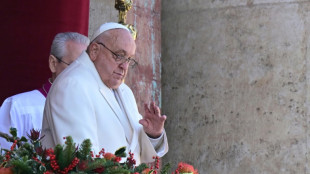
-
 Pope calls for 'arms to be silenced' in Christmas appeal
Pope calls for 'arms to be silenced' in Christmas appeal
-
Syria authorities say torched 1 million captagon pills

-
 Pope calls for 'arms to be silenced' across world
Pope calls for 'arms to be silenced' across world
-
32 survivors as Azerbaijani jet crashes in Kazakhstan

-
 Pakistan air strikes kill 46 in Afghanistan, Kabul says
Pakistan air strikes kill 46 in Afghanistan, Kabul says
-
Liverpool host Foxes, Arsenal prepare for life without Saka

-
 Japan FM raises 'serious concerns' over China military buildup
Japan FM raises 'serious concerns' over China military buildup
-
Pope's sombre message in Christmas under shadow of war

-
 Zelensky condemns Russian 'inhumane' Christmas attack on energy grid
Zelensky condemns Russian 'inhumane' Christmas attack on energy grid
-
Sweeping Vietnam internet law comes into force

-
 Pope kicks off Christmas under shadow of war
Pope kicks off Christmas under shadow of war
-
Catholics hold muted Christmas mass in Indonesia's Sharia stronghold

-
 Japan's top diplomat in China to address 'challenges'
Japan's top diplomat in China to address 'challenges'
-
Thousands attend Christmas charity dinner in Buenos Aires

-
 Demand for Japanese content booms post 'Shogun'
Demand for Japanese content booms post 'Shogun'
-
As India's Bollywood shifts, stars and snappers click

-
 Mystery drones won't interfere with Santa's work: US tracker
Mystery drones won't interfere with Santa's work: US tracker
-
Djokovic eyes more Slam glory as Swiatek returns under doping cloud

-
 Australia's in-form Head confirmed fit for Boxing Day Test
Australia's in-form Head confirmed fit for Boxing Day Test
-
Brazilian midfielder Oscar returns to Sao Paulo

-
 'Wemby' and 'Ant-Man' to make NBA Christmas debuts
'Wemby' and 'Ant-Man' to make NBA Christmas debuts
-
US agency focused on foreign disinformation shuts down

-
 On Christmas Eve, Pope Francis launches holy Jubilee year
On Christmas Eve, Pope Francis launches holy Jubilee year
-
'Like a dream': AFP photographer's return to Syria

-
 Chiefs seek top seed in holiday test for playoff-bound NFL teams
Chiefs seek top seed in holiday test for playoff-bound NFL teams
-
Panamanians protest 'public enemy' Trump's canal threat

-
 Cyclone death toll in Mayotte rises to 39
Cyclone death toll in Mayotte rises to 39
-
Ecuador vice president says Noboa seeking her 'banishment'

-
 Leicester boss Van Nistelrooy aware of 'bigger picture' as Liverpool await
Leicester boss Van Nistelrooy aware of 'bigger picture' as Liverpool await
-
Syria authorities say armed groups have agreed to disband

-
 Maresca expects Man City to be in title hunt as he downplays Chelsea's chancs
Maresca expects Man City to be in title hunt as he downplays Chelsea's chancs
-
Man Utd boss Amorim vows to stay on course despite Rashford row

-
 South Africa opt for all-pace attack against Pakistan
South Africa opt for all-pace attack against Pakistan
-
Guardiola adamant Man City slump not all about Haaland

-
 Global stocks mostly higher in thin pre-Christmas trade
Global stocks mostly higher in thin pre-Christmas trade
-
Bethlehem marks sombre Christmas under shadow of war

-
 NASA probe makes closest ever pass by the Sun
NASA probe makes closest ever pass by the Sun
-
11 killed in blast at Turkey explosives plant

-
 Indonesia considers parole for ex-terror chiefs: official
Indonesia considers parole for ex-terror chiefs: official
-
Global stocks mostly rise in thin pre-Christmas trade

-
 Postecoglou says Spurs 'need to reinforce' in transfer window
Postecoglou says Spurs 'need to reinforce' in transfer window
-
Le Pen says days of new French govt numbered

-
 Global stocks mostly rise after US tech rally
Global stocks mostly rise after US tech rally
-
Villa boss Emery set for 'very difficult' clash with Newcastle

-
 Investors swoop in to save German flying taxi startup
Investors swoop in to save German flying taxi startup
-
How Finnish youth learn to spot disinformation

-
 South Korean opposition postpones decision to impeach acting president
South Korean opposition postpones decision to impeach acting president
-
12 killed in blast at Turkey explosives plant

-
 Panama leaders past and present reject Trump's threat of Canal takeover
Panama leaders past and present reject Trump's threat of Canal takeover
-
Hong Kong police issue fresh bounties for activists overseas


Studies to see if mutations behind monkeypox spread: WHO
Studies are under way to see whether genetic changes in the monkeypox virus are driving the rapid spread of the disease, the World Health Organization told AFP on Wednesday.
The two distinct clades, or variants, of the virus were called the Congo Basin (Central African) and West African clades, after the two regions where they are each endemic.
On Friday, the WHO renamed the groupings as Clade I and Clade II respectively, to avert the risk of geographic stigmatisation.
It also announced that Clade II had two sub-clades, IIa and IIb, with viruses within the latter identified as being behind the the current global outbreak.
On Wednesday, the UN health agency specified that Clades IIa and IIb are related and share a recent common ancestor -- therefore IIb is not an offshoot of IIa.
- Research into mutations -
Clade IIb contains viruses collected in the 1970s, and from 2017 onwards.
"Looking through the genome, indeed there are a few genetic differences between the viruses from the current outbreak and the older Clade IIb viruses," the WHO told AFP.
"However, nothing is known about the significance of these genetic changes, and research is ongoing to establish the effects (if any) of these mutations on transmission and disease severity.
"It is still early on in both the outbreak and laboratory studies to tell if the rise in infections could be driven by the observed genotypic changes in the virus, or are due to host (human) factors."
There is also no information yet on what the mutations mean in terms of how the virus interacts with the human immune response.
A surge in monkeypox infections has been reported since early May outside the endemic African countries.
The WHO declared the situation an international public health emergency on July 23.
More than 35,000 cases in 92 countries, and 12 deaths, have now been reported to the WHO.
Almost all new cases are being reported from Europe and the Americas.
Experts have been studying samples from cases.
"The diversity between the viruses responsible for the current outbreak is minimal, and there is no obvious genotypic differences between the viruses from the non-endemic countries," the WHO said.
- Renaming monkeypox could take months -
Meanwhile the WHO said its drive to rename monkeypox could take "a number of months".
The organisation has for weeks voiced concern about the name, with experts concerned that it is misleading.
Monkeypox received its name because the virus was originally identified in monkeys kept for research in Denmark in 1958.
However, the disease is found most frequently in rodents, and the current outbreak is being spread through human-to-human close contact.
The WHO has called for help from the public in coming up with a new name, with a dedicated website where anyone can make suggestions.
"We will update the public by the end of the year," the WHO said.
F.Bennett--AMWN


